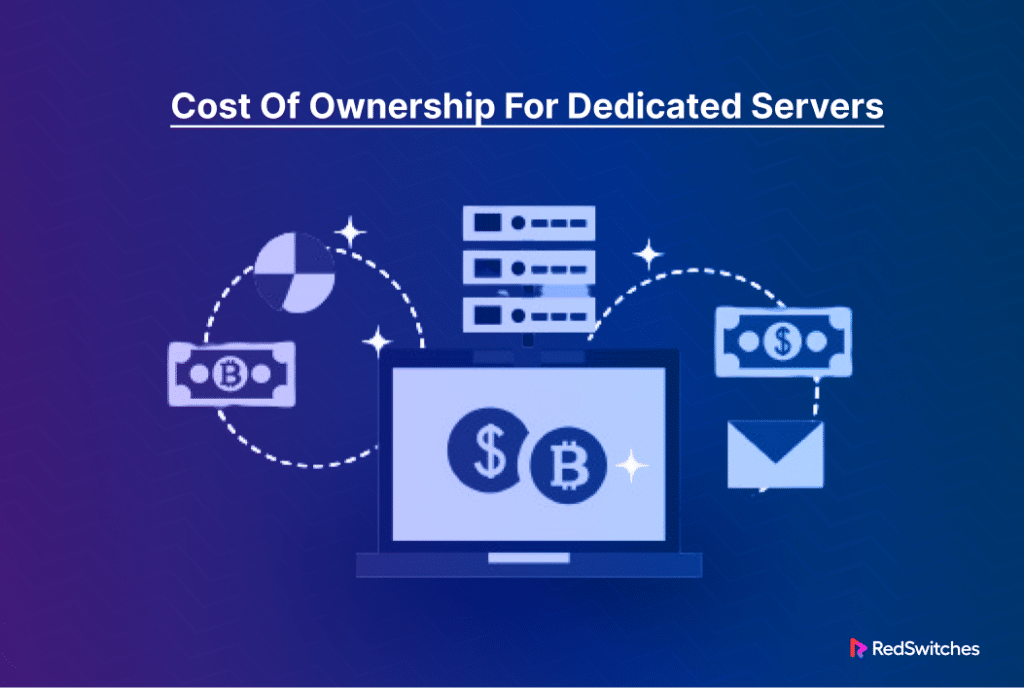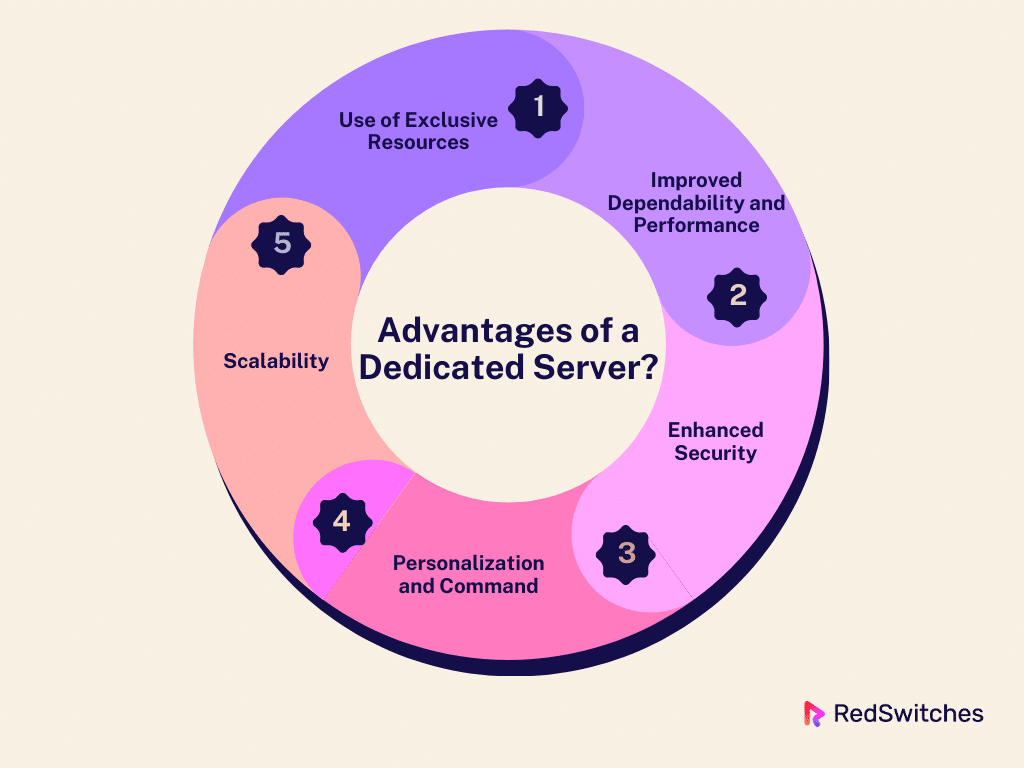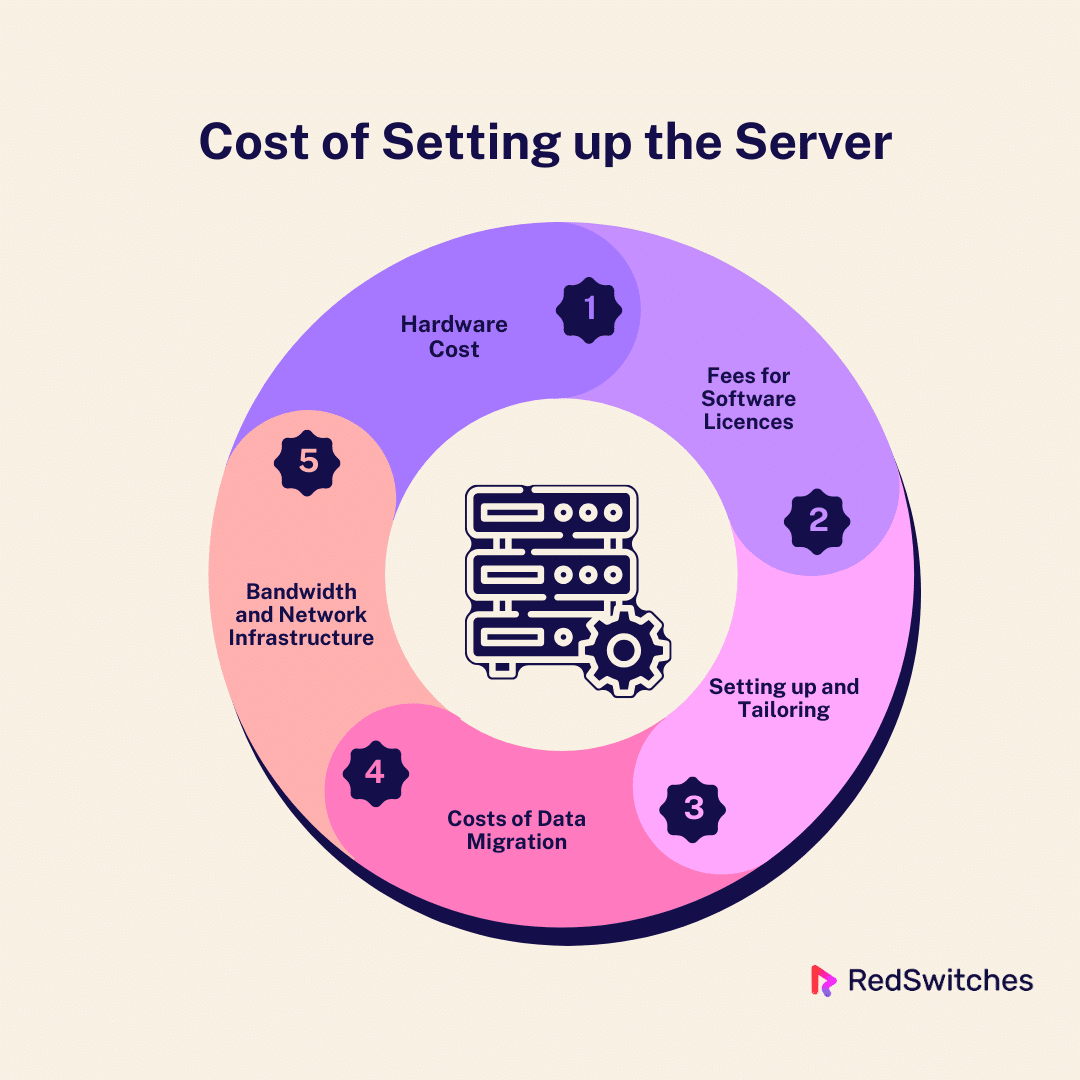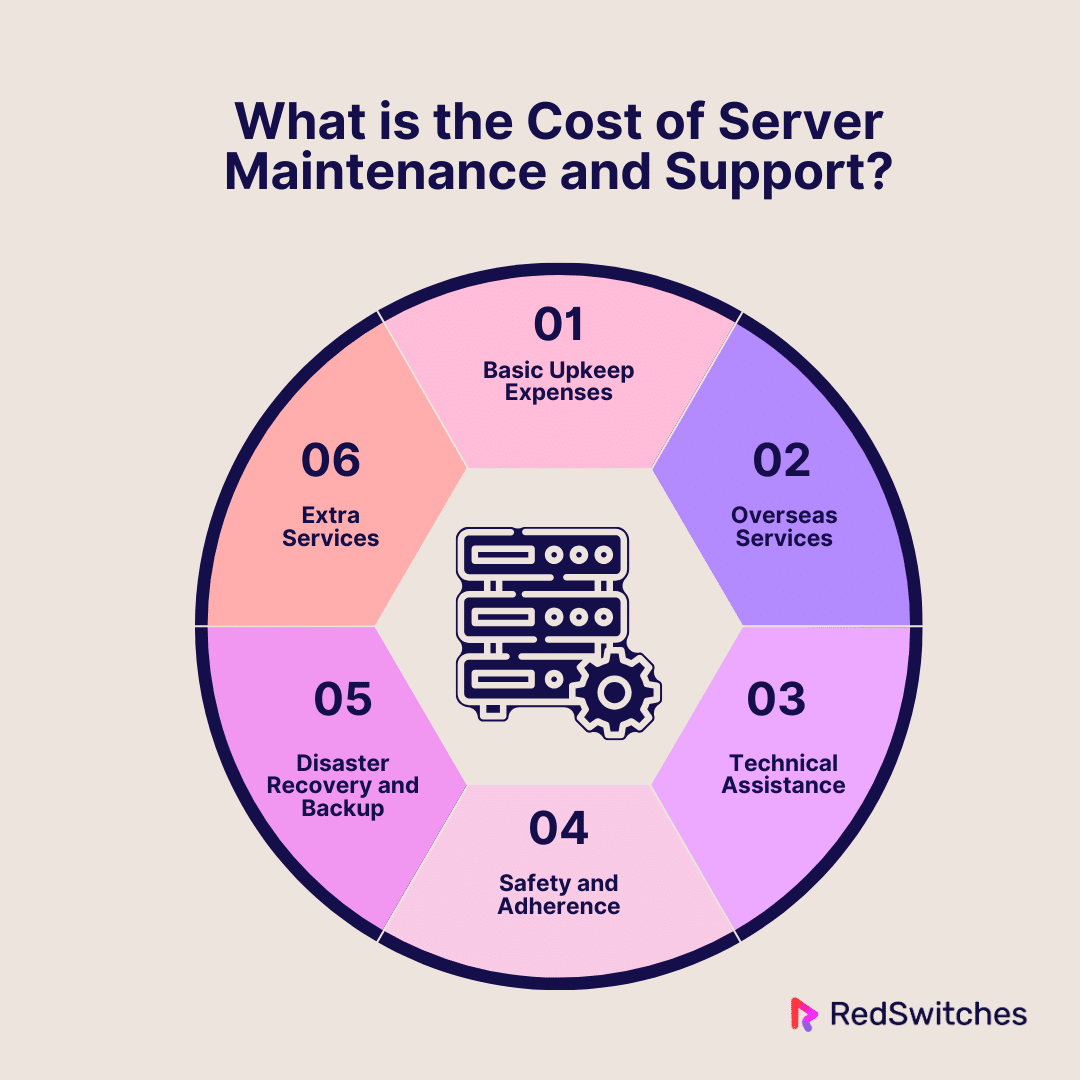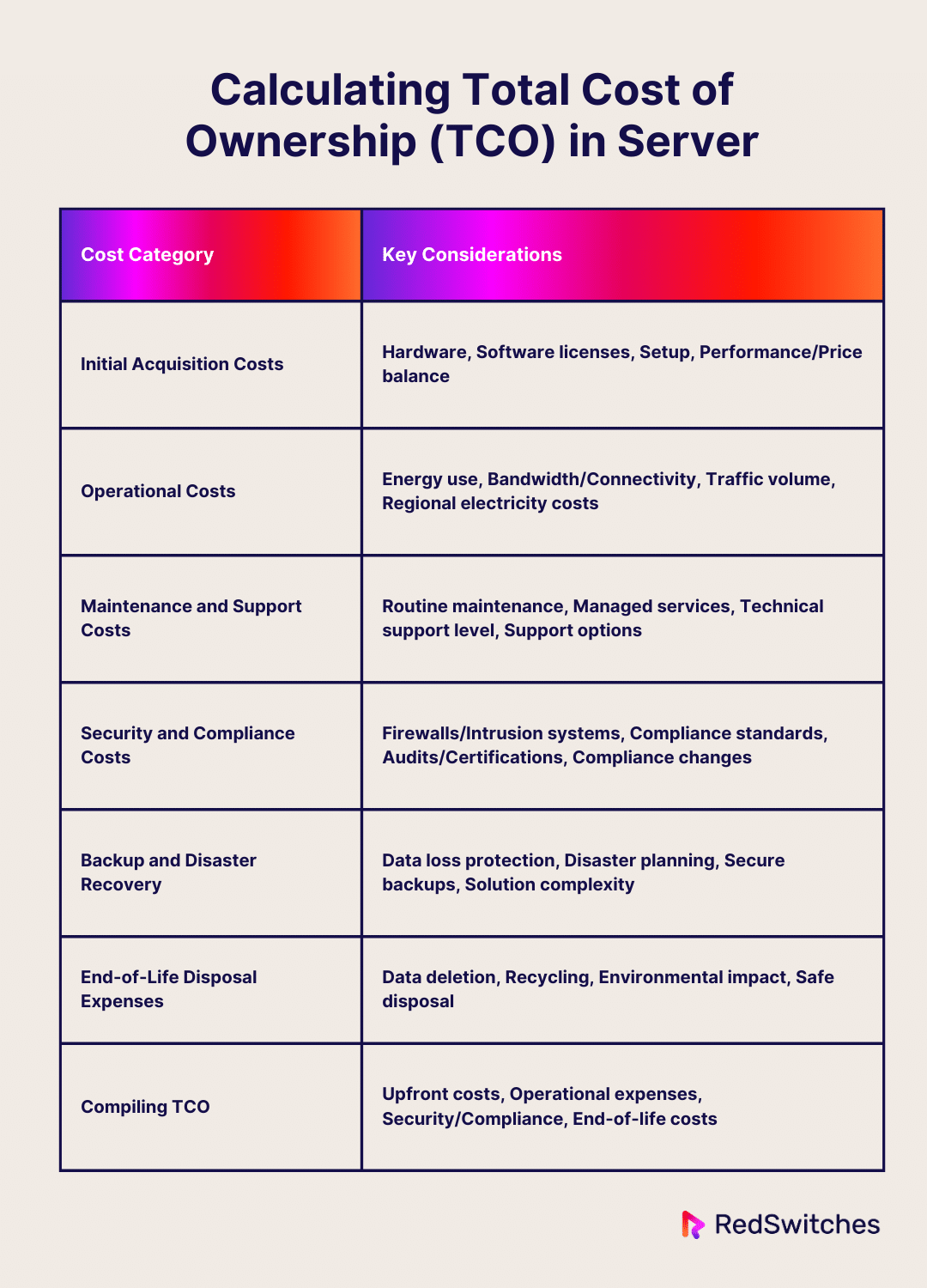Key Takeaways
- Servers offer unmatched access to server resources, including CPU, RAM, and bandwidth, ensuring optimal performance without the limitations experienced in shared hosting environments.
- With tailored configurations to meet specific needs, servers provide superior reliability and performance.
- Complete control over the server environment allows for implementing advanced security measures.
- The ability to choose operating systems, install custom applications, and adjust configurations provides a level of customization and control.
- Servers are inherently scalable, allowing for easy upgrades to hardware and bandwidth.
- Understanding the TCO for dedicated servers involves considering initial hardware and software costs, ongoing operational expenses, maintenance, and support fees.
- Investing in a server is a strategic decision that requires balancing initial costs against long-term benefits like performance.
Dedicated servers rule the digital world, where dependability and speed are paramount. But, the complex cost issue often hides how to use these powerful digital rulers. In the dark depths of server expenses, “Decoding Dedicated Server Costs” is your torch. This blog walks you through a journey from the initial expenditure to the secret hallways of indirect costs, unraveling the mystery of the total cost of ownership (TCO) for dedicated servers.
This guide aims to provide you, the business leader seeking to improve your online presence or the seasoned IT professional, with the knowledge necessary to make well-informed decisions that will guarantee your dedicated server investment not only supports but also expedites your organization’s goals. Let’s embark on this insightful adventure to turn cost obstacles into strategic benefits together.
Table of Contents
- Key Takeaways
- What is a Dedicated Server?
- What are the Advantages of a Dedicated Server?
- What Features Should You Look For When Buying A Dedicated Server?
- Factors That Influence The Cost of Your Server
- What is the Cost of Setting up the Server?
- What is the Cost of Server Maintenance and Support?
- Calculating Total Cost of Ownership (TCO) in Server
- Conclusion
- FAQs
What is a Dedicated Server?
Credits: Freepik
With a dedicated hosted server, a customer rents the entire server, which is not shared with other users. This is different from VPS (Virtual Private Server) hosting. VPS splits one server into many virtual machines. Each machine acts as a separate server. Shared hosting shares server resources among many clients. Dedicated hosted Servers offer the best control, privacy, and resource allocation.
If you choose a physical server, you can exclusively use its CPU, RAM, storage capacity, and bandwidth. This exclusivity guarantees that other users’ demands or traffic surges won’t interfere and that your website or application will be able to fully use the server.
Servers are usually kept in data centers. They benefit from the centers’ physical security, power redundancy, and fast internet access. Customers can choose the operating system and applications they want to install. They can also pick the server’s physical configuration. This gives them full control over the hosting environment. This degree of control is perfect for companies with unique needs that shared or VPS hosting cannot satisfy.
Also, servers have dedicated IP addresses. They improve your website’s reputation by setting it apart from others’ activity. This is key for companies using FTP or SSL. It ensures safe and reliable connections.
What are the Advantages of a Dedicated Server?
Let’s understand the benefits of servers.
Use of Exclusive Resources
A server has a unique benefit: exclusive access to server and resources. This sets it apart from the limits of shared hosting. Important resources like CPU power, RAM, and bandwidth are split among multiple sites in a shared hosting. This may cause slow-downs during times of high demand. On the other hand, a server allows all of its resources to a single client, guaranteeing that your online apps and services run as smoothly and efficiently as possible. Your online operations will always function easily and dependably because of this exclusivity, which effectively removes the possibility of performance degradation brought on by the resource demands of other websites.
Improved Dependability and Performance
Servers are distinguished by their outstanding dependability and performance. The servers are designed specifically to meet your needs. They can easily handle heavy traffic spikes and demanding jobs. This feature is essential for websites that receive a lot of traffic or apps that demand a lot of processing power. Servers are very dependable. They have less downtime. This keeps your online presence reliable. Keeping your users’ confidence and happiness requires a flawless online experience. It must promote repeat use and loyalty. Dependability is key.
Enhanced Security
You have complete control over the server’s settings and configurations. So, security in a server is much higher. You can use this power to add security measures. These measures can be tailored to your needs. They include things like advanced firewalls, unique encryption, and security software. By protecting your website from potential blacklisting, a dedicated IP prevents problems that are common in shared hosting. In shared hosting, several sites share a single IP.
Personalization and Command
There is no comparison to a server’s degree of control and customization. Customers can choose the operating system, install custom applications, and adjust server configurations to match their unique application requirements precisely. Businesses operating within unique software systems or must comply with certain compliance laws may find this customization level quite advantageous. The flexibility to customize every element of the hosting environment guarantees that your server satisfies and beyond your operational needs, providing an optimized platform that successfully supports your strategic goals.
Scalability
Dedicated private server hosting is known for its scalability, which provides flexibility to handle growth without sacrificing performance. Upgrading your server’s hardware, including CPU power, RAM usage, and storage capacity, becomes a simple process as your company grows and your website traffic rises. Because of its scalability, your hosting infrastructure will expand with your company, giving you the resources you need to meet operational demands and growth spikes. Dedicated hosting ensures that your online presence stays strong and responsive, prepared to handle the demands of growing operations by simplifying server specs.
What Features Should You Look For When Buying A Dedicated Server?
Let’s look at the features you should consider when buying a server.
Hardware Specifications
The server’s performance and efficiency are greatly influenced by its hardware. The CPU’s power, or processor, is important. A modern, multi-core processor with a fast clock can greatly improve the server’s ability to do computations. This is key when running resource-intensive applications. RAM on the server is vital for smooth operation. It allows many processes to run at once. Depending on your unique requirements, setups offering anywhere from 16GB to 64GB of memory or more should be considered for best performance. Another important factor to think about is storage options. Solid State Drives (SSDs) are better than conventional Hard Disc Drives (HDDs). This is due to their higher data access rates and dependability. They are recommended for sites expecting large numbers of visitors.
Data Transfer and Bandwidth
Your server’s bandwidth and data transfer capabilities are crucial. This is especially true if you want your website or application to handle high traffic or manage huge file transfers. We need high or unmetered bandwidth. It’s to handle the data surge without extra costs or performance issues at peak traffic. Choose a provider with lots of bandwidth. This will ensure your server can handle the data to and from your website without interruption. This will give users a smooth experience and keep operations efficient, even under high traffic.
Guaranteed Network Uptime and Quality
A server in a data center with a robust network architecture is the cornerstone of a dependable web presence. A high uptime guarantee shows a provider’s dedication to keeping service going. It’s usually 99.95% or more. This reduces the risk of downtime. Downtime can disrupt business and hurt user confidence. These assurances show the quality of the data center’s network architecture. It has redundant power supplies, networking hardware, and connectivity options. They work together to keep your server online when it matters most—your website or application.
Options for Scalability
You’ll require more server resources as your internet presence expands. Working with a hosting company is crucial. They provide customizable scalability choices. This is key to maximizing your server’s RAM, CPU power, and storage. It is flexible. You can easily upgrade your resources to meet your changing needs. You won’t have to worry about major downtime or server migration. It makes your operations scale smoothly. It also future-proofs your investment. It ensures your server can change to meet your needs.
Features of Security
You cannot overstate your server’s security’s importance. Cyberattacks are becoming more complex. You need a complete security suite. It should have firewalls, SSL certificates, DDoS protection, and regular security updates. Also, RAID setups provide extra data redundancy. They protect against data loss from hardware malfunctions. Securing your online assets with a server outfitted with cutting-edge security features gives you peace of mind and a safe starting point for your digital ventures.
Factors That Influence The Cost of Your Server
Let’s evaluate the factors that affect the cost of your server.
Hardware Details
Choosing the right server hardware is essential for a server. It affects price, performance, and capacity. Large databases, intricate programs, and data analytics platforms are among the tasks that require a significant amount of processing power, and these tasks require high-performance CPUs with more cores and faster clock speeds. The decision between SSDs and HDDs is also very important; SSDs are the better option because of their exceptional speed and durability benefits, even with their greater price. High-end hardware may be more expensive upfront. Still, it guarantees that your server can manage heavy workloads easily, giving users a seamless experience and possibly lowering the frequency of upgrades.
Limits on Bandwidth and Data Transfer
Considerations such as bandwidth and data transfer capacities are essential, especially for services that broadcast high-definition video, run extensive web platforms, or handle big file transfers. High or unmetered bandwidth plans, although more expensive, protect your online operations against the possibility of service interruptions or extra fees during periods of unanticipated traffic spikes. Accurately estimating the bandwidth requirements for your project is crucial to selecting a plan that fits your traffic demands while weighing the costs and benefits of maximum performance and reliable service.
Guaranteed Network Uptime and Quality
To keep a strong online presence, excellent uptime and high-quality network infrastructure are essential. Advanced technology-equipped data centers that provide redundancy in power and connectivity usually fetch higher prices. However, the increased dependability these facilities offer—which reduces downtime and guarantees that your audience can always access your digital assets—justifies their investment. An uptime guarantee is an important consideration when choosing a host since it is more than just a figure; it represents a dedication to operational excellence that fosters user trust.
Administration and Assistance for Servers
Although it may cost more each month, choosing a server with full management and support services has many advantages. By relieving you of the technical challenges of server administration, managed hosting frees you up to focus on important business goals. This approach offers a safety net that can be very helpful for companies without substantial IT staff, covering everything from routine maintenance to emergency assistance. For companies that value dependability and efficiency above all else, managed services are a desirable alternative since they may provide organizations with peace of mind and save time.
Extra Features and Services
While adding more services and features to your server plan increases its usefulness, it also raises the price. Maintaining service continuity and protecting your data require services like DDoS prevention and automated backups. Simultaneously, software licenses, such as those for operating systems and control panels, enhance the server’s operational capabilities and user-friendliness. These extra costs are essential for a comprehensive and safe hosting solution that lets companies fully use their server while maintaining high security and customer happiness. The value these services bring to your business should be considered in the cost-benefit analysis since they are frequently necessary rather than optional expenditures.
What is the Cost of Setting up the Server?
Let’s understand the cost of setting up the server.
Hardware Cost
The cost of the hardware is the foundation of your server’s performance. It can greatly affect your setup cost. You need to pick modern CPUs. They have many cores and fast speeds. They are needed to run programs quickly. But they are more expensive. Similarly, giving your server a substantial quantity of fast RAM guarantees seamless multitasking—a need in high-load situations. The type of storage used is also important. SSDs are more reliable. They also have higher read/write rates than HDDs. This improves server response times, especially for data-heavy applications. Top-tier hardware combinations are more dependable and functional. That’s why they can quickly get expensive.
Fees for Software Licences
An important part of the setup expenses is software licensing. The main expense comes from choosing the operating system. Linux versions may be cheaper if you can access open-source software. However, you may still have to pay for enterprise editions or premium support. Although Windows Server licenses are more expensive overall, they give many administrators a recognizable environment. They are known as control panels, such as Plesk or cPanel. They make server management easier outside the operating system. But, they increase costs due to their licensing fees. More software is needed for database administration, security, and app features. This extra software raises the expenses. Purchasing software licenses is essential to guarantee a safe, controllable, and useful server environment that fits your unique operating needs.
Setting up and Tailoring
Setting up a server to match specific needs requires work. The work might vary in cost and complexity. Extra fees may apply for advanced security setup, speed improvement, app setup, and basic system setup. Providers of bespoke configuration services often base their fees on needed labor and experience. This recognizes the importance of tailoring a server environment to your demands. This customization ensures that your server works best for your applications. But, it needs a larger initial investment. This shows the trade-off between customization and cost.
Costs of Data Migration
Data migration is required from an existing hosting environment to a new server. The cost depends on the amount of data, the complexity of the applications, and the need for expert services. Providers at different price points may offer migration services. Basic migrations may be free, while extensive, managed transfers may cost more. Professional migration services are a useful investment for organizations. They want to minimize interruption during transfers. This is because ensuring a smooth transition without data loss or downtime is complex.
Bandwidth and Network Infrastructure
You must set up a reliable network and allocate enough bandwidth to meet your data transfer needs. This is part of setting up a server. The costs of network configuration and bandwidth provisioning may increase. This is especially true in situations needing high throughput or high availability. These situations require dedicated IPs, improved DDoS protection, or premium bandwidth. Choosing unmetered bandwidth packages results in predictable costs. But, the base cost is usually higher. Your hosted apps’ total online availability, rapid data transfers, and dependable connectivity depend on these network infrastructure and bandwidth investments, directly impacting the user experience and business continuity.
What is the Cost of Server Maintenance and Support?
Let’s understand the detailed background of the maintenance cost of the server.
Basic Upkeep Expenses
Regular operating systems and installed program updates, security patch installations, and server performance and health monitoring are all considered basic server maintenance. Providers might include this in their hosting packages or sell it as a basic maintenance plan. The amount can vary each month according to the level of services rendered, from $50 to several hundred dollars. Maintaining your server’s functionality and preventing potential security flaws require these fundamental services.
Overseas Services
Fully managed server hosting is desirable for companies without a dedicated IT staff or those wishing to direct their IT resources elsewhere. In addition to hardware replacements, sophisticated security measures, backup and disaster recovery plans, and application-specific support, managed services can offer round-the-clock monitoring and on-demand assistance. The monthly cost of managed services can differ significantly, generally falling between $50 and over $500, depending on how extensive the services are. Choosing managed services can guarantee professional server upkeep and greatly lessen the workload for your internal personnel.
Technical Assistance
The amount and responsiveness of technical help provided also greatly impact maintenance expenses. While hosting packages frequently offer basic assistance, more advanced solutions, such as personal account managers, expedited response times, or direct access to senior experts, can come at a higher cost. Certain providers charge for premium help individually, or they provide tiered support programs. Higher support levels are invested to ensure that problems can be fixed quickly and efficiently, reducing downtime and possible revenue losses.
Safety and Adherence
Ensuring your server complies with compliance and security regulations may cost more. Advanced firewalls, intrusion detection systems, server SSL certificates, and compliance checks (like PCI DSS for payment processing) are a few examples. The cost for these security measures can range from a few dollars a month for SSL certificates to several hundred dollars monthly for comprehensive security and compliance management. You must invest in strong security procedures to safeguard sensitive data and keep consumers’ trust.
Disaster Recovery and Backup
Server maintenance must include regular backups and a strong disaster recovery plan to guard against data loss due to hardware malfunctions, cyberattacks, or human error. The monthly cost of disaster recovery and backup services can vary from $20 to $100 or more, contingent on the volume of data stored up and the frequency of backups. While some providers might need outside assistance, others offer integrated backup solutions.
Extra Services
The total cost may increase if additional maintenance and support services are required, such as database management, performance optimization, software installation, or upgrades. These services may be included in a more comprehensive maintenance package or invoiced hourly.
Calculating Total Cost of Ownership (TCO) in Server
Credits: Freepik
Calculating Total Cost of Ownership (TCO) for servers is complex. It exceeds the server’s purchase price, including ongoing operating and extra costs. To guarantee a thorough assessment, it is important to consider the subsequent cost categories:
Initial Acquisition Costs
A server involves more than buying hardware; it’s a significant investment. Your CPUs, RAM, and storage choices directly impact the server’s capabilities and cost. So, balancing price and your applications’ performance needs is important. The initial costs might also be much higher due to software licensing fees. This is especially true for proprietary operating systems. They require specialized management tools for the best server performance. Additional expenses are associated with the setup and customization of the server, including installing required programs, configuring it for particular workloads, and ensuring it satisfies your operational requirements.
Operational Costs
Maintaining a server daily entails several operating costs that can increase over time. Energy use is significant. Servers need power continuously for cooling and operation to avoid overheating. Significant-performance servers or those situated in regions with expensive electricity prices may incur especially significant expenditures. Also important are connectivity and bandwidth. Servers that support large data transfers or high traffic may charge more. This is to guarantee enough bandwidth and reduce delay. This quickly affects the effectiveness and user experience of hosted apps.
Costs Associated with Maintenance and Support
Keeping your server reliable and long-lasting requires routine maintenance. This includes regular inspections. It also includes timely software upgrades to fix bugs. And replacing old hardware parts to prevent malfunctions. Choosing managed services can provide peace of mind and free up resources for other activities. But, they come at a cost and can reduce the stress of these duties. Expenses can also be impacted by the type of technical support selected. However, basic support might be adequate for certain companies; others that depend on their operations might need immediate access to professional help, resulting in higher premium support expenses.
Security and Compliance Costs
Investing in top security is essential. It safeguards sensitive data and upholds confidence. This is key as cyber threats change. You must invest heavily in firewalls, intrusion detection systems, and secure access protocols. This is necessary to prevent attacks. Ensuring that your server environment complies with relevant compliance standards can also increase costs. Regular audits, certifications, and possibly server configuration changes are required to meet legal and industry requirements.
Backup and Disaster Recovery
A strong backup and disaster recovery plan is vital. Data loss can come from cyberattacks, hardware failures, and human error. Disaster recovery planning puts in place mechanisms. They restore data and keep operations going after a catastrophe. But, comprehensive backup solutions ensure that data is regularly copied and kept securely. Your backup and disaster recovery solutions will depend on their complexity. More complex solutions are also more frequent and redundant. They will cost more but provide better protection and resilience.
Expenses Associated with End-of-Life Disposal
Servers eventually need to be decommissioned after reaching the end of their useful lives. To reduce the environmental impact, responsible disposal practices include deleting sensitive data to stop unauthorized access. They also include recycling or disposing of hardware. These activities may have costs for data destruction and recycling. These costs are needed to ensure the safe and moral disposal of old server equipment.
Compiling Total Cost of Ownership (TCO)
Compiling all related expenses incurred during a server’s operating life is essential to compute TCO. This thorough analysis covers many costs. It includes the upfront prices for acquisition (hardware, software licenses, and setup). It also covers ongoing operational costs (energy, connectivity, and maintenance). Security protocols, rules, and disaster recovery costs affect the TCO. They are part of regulatory and backup requirements.
Comparing Alternatives
After you find the total cost of ownership (TCO) for a dedicated server setup, you must compare it with other options. This is crucial for making an informed choice. For example, comparing the total cost of ownership (TCO) for different hardware setups can cut costs or boost performance. The comparison can make the TCO match business needs better.
Let’s summarize it in a tabular format.
Conclusion
In conclusion, companies need good information to make IT decisions. Knowing the Total Cost of Ownership (TCO) for servers is essential. Organizations may ensure they select solutions that give the best value and fit their long-term goals. They can do this by carefully counting all costs related to buying, running, and maintaining a server over its life. Consider different setups and hosting choices, like cloud services. They give businesses more flexibility to customize their IT investments. This is so they can meet their unique requirements.
RedSwitches shows itself as a trustworthy partner by providing a selection of server options to maximize efficiency, security, and affordability. Businesses may use our knowledgeable support and adaptable solutions to suit their specific needs, ensuring their server approach is economical and effective.
FAQs
Q. What is the cost of a dedicated server?
Servers can cost from $50 to $2000 per month, depending on the hosting company and the server’s features.
Q. Is a home server expensive?
The cost of a home server varies depending on what it will be used for; a basic configuration may only cost a few hundred dollars, while more sophisticated hardware and software requirements might drive up prices.
Q. Is a dedicated server worth it?
Yes, a dedicated server can be worth it for businesses requiring high performance, security, and control over their hosting environment, especially for those with resource-intensive applications or specific compliance needs.
Q. Is cloud cheaper than dedicated server?
Cloud hosting can be cheaper than a dedicated server for businesses with fluctuating traffic and those looking for scalability without the upfront hardware costs. However, a dedicated server might offer better value in the long run for sustained high-resource use.
Q. What is server hosting?
Server hosting involves renting an entire server solely for your website or application, providing full control over server resources and configurations.
Q. How does dedicated hosting differ from shared hosting?
Shared hosting involves multiple websites sharing resources on the same server, while dedicated hosting exclusively uses a server for one user.
Q. What factors determine the cost of a server?
The cost of a server is determined by factors such as hardware specifications, server location, bandwidth requirements, and additional services like managed hosting.
Q. How do I choose the right hosting plan for my needs?
To choose the right hosting plan, consider factors such as your website’s traffic volume, resource requirements, budget, and any specific software or applications you need to run.
Q. What should I look for in a dedicated hosting provider?
When choosing a dedicated hosting provider, consider factors such as server reliability, customer support, security measures, scalability options, and pricing transparency.
Q. What are the benefits of a server over other hosting options?
Dedicated servers offer higher performance, improved security, customization options, and better control over server resources compared to shared or VPS hosting.
Q. How can I compare dedicated server pricing between different providers?
To compare server pricing, carefully review the hardware specifications, including services, support options, contractual terms, and any additional fees charged by each provider.
